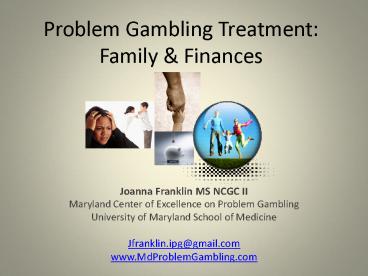Problem Gambling Treatment: Family - PowerPoint PPT Presentation
1 / 20
Title:
Problem Gambling Treatment: Family
Description:
Problem Gambling Treatment: Family & Finances Joanna Franklin MS NCGC II Maryland Center of Excellence on Problem Gambling University of Maryland School of Medicine – PowerPoint PPT presentation
Number of Views:119
Avg rating:3.0/5.0
Title: Problem Gambling Treatment: Family
1
Problem Gambling Treatment Family Finances
- Joanna Franklin MS NCGC II
- Maryland Center of Excellence on Problem Gambling
- University of Maryland School of Medicine
- Jfranklin.ipg_at_gmail.com
- www.MdProblemGambling.com
2
Children of Pathological Gamblers
- High School Youth with a problem gambling parent
were more likely to report - Abusing stimulant drugs
- Overeating
- Describe childhood as unhappy
- Be depressed or Suicidal
- Have legal action pending (Jacobs 1989)
- More likely to have a gambling problem themselves
(Lesieur and Klein 1987)
3
Children of Problem Gamblers
- 8-10 other people are affected by every
pathological gambler. (Lobsinger Beckett, 1996) - Consequences include but are not limited to
- Financial losses
- Communication problems
- Trust Issues
- Chronic lying
- Legal problems
- Domestic violence (23-40 - Gerstein et al 1999
and Bland, Newman,
Orn Stebelsky 1993)
4
Family Treatment Issues
- Monitor levels of conflict
- Assertiveness and Communication Skills Training
- Coaching on financial issues and decision making
- May need money manager outside of family
- Treat within the context of the Culture.
5
Family Treatment Issues
- Assess need for individual counseling for family
members - Time for expressing anger, fear, distrust
- Specific counseling around abuse/violence
- Facilitate discussion around issues of
separation/divorce - Counseling on limit setting, detaching with love
6
Family Treatment Issues
- Education
- On comorbid psychopathology and risk factors as
well as pathological gambling - Coping with suicidality
- Interaction of gambling progression and
psychopathology - Maintaining personal as well as financial safety
for family - PG as potentially recurring, chronic disorder
7
Family Treatment Issues
- Dealing with Toxic Anger
- Control v. Involvement (limit setting with family
members) - Family pathology often severe
- Family offers little or no support
- No local self-help resources
- Family pathology and money management- need for
financial safety
8
Family Treatment Issues
- Help family understand shared dynamics/pathology
- Listening/Communication skills
- Here and Now orientation
- Maintaining adult ego state
- Conflict Resolution and Problem Solving skills
9
Treatment Issues
- Final Assessment
- Discussion of relapse warning signs
- How can family provide feedback
- How can gambler listen to feedback
- Gamblers and family members triggers
10
- Integrative Behavioral Couples Therapy IBCT
- (Jacobson Christensen 1996, 2001) suggests
- Regularly discuss differences between the couple-
this is to reinforce seeing the problem as an
it. - 2. Discuss upcoming events in light of their
differences anticipating potential conflicts. - 3. Therapist and couple would process recent
negative events with empathic joining to diminish
negative feelings around unpleasant exchanges. - 4. Process positive events reinforcing how each
contributes through tolerance and acceptance of
each others difference.
11
IBCT Family Gambling Treatment
Couples seem to abandon quickly precise, clearly
operationalized strategies so carefully taught.
(Jacobson Christensen 1996) Data analysis
indicates behavioral change can only go so far.
People have a limited capacity to
change. Successful intimate relationships
exhibit a high degree of tolerance. Developed the
paradox of acceptance and change-we change best
when we feel accepted. Rather than teaching an
array of artificial communication techniques,
wouldnt make more sense to teach strategies that
felt natural.
12
IBCT Family Treatment
- Present the couple with a formulation of how
things got the way they are. - A tentative hypothesis for which the couple
provides feedback - Provides a tool for empathic joining- problem is
the it, not him or her, or him and him, or her
and her. - Polarization vs. acceptance each tries to change
the other, digs in heels, acts out, control
battles
13
Financial Management Issues
- The Budget vs. Asset Protection Plan
- G.A. Pressure Relief Group
- List of all debts and creditors
- List monthly expenses
- List of all income and assets
- Prepare the Plan
- Restitution
- Money Management
14
Assessing Debt
Owed To Amount Interest Min. Payment Responsible Priority
15
Defining Asset Protection Plan
Income Source Date Received Paid To Amt after Deductions
16
Defining Monthly Expenses
Expense Pay To Due Date Amt Due
Rent/Mortg
Gas
Electric
Water
Taxes
Food
Phone
Etc
17
Other Personal/Emotional Debts
Name of Person Nature of Debt Approx Date Means of Amends
18
Money Protection Plan
- Case examples Sally
- 58 year old, school teacher
- Depleted savings, owes 10,000 on credit cards,
cashed in insurance policies, bad checks - She has always managed finances
- Husband very angry, very controlling,
relationship marked by power struggles - Children live out of state, but very supportive
- Has close friend who is recovering alcoholic and
wants to be supportive - Husbands brother is financial planner
19
IBCT Family Treatment
Caution Over-predicting of negative
consequences Catastrophizing crisis
circumstances-believing I cant cope. Anger as
a defense against re-victimization Self-blame for
gambling behavior Response Cost-benefit
analysis Concrete examination of resources Anger
reduction techniques- alternative defenses, focus
on self and personal growth. Challenge
character conclusions about self
20
Treatment Resources
- Counseling the Problem Gambler A Self Regulation
Manual - Joseph Ciarrocchi PhD.
- Pathological Gambling Eitology, Comorbidity and
Treatment. Nancy Petry PhD - Dont Leave it to Chance . E.J. Federman,
C.E.Drebing C. Krebs. - Losing Your Shirt. M. Heineman
- Behind the 8 Ball. L. Berman M.E. Siegel.
- Personal Financial Strategies for the Loved Ones
of Problem Gamblers. National Endowment for
Financial Education and National Council on
Problem Gambling. - Gamblers Anonymous Pressure Relief Workbook
- www.Gamblersanonymous.org































